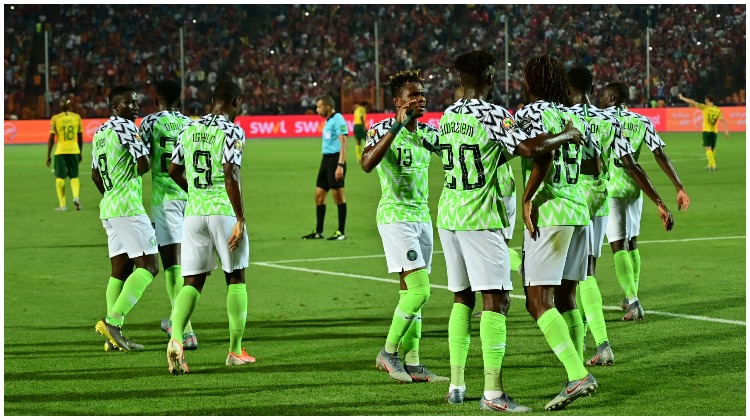The Stakes are High: Nigeria and South Africa Clash in Crucial World Cup Qualifier
The 2026 FIFA World Cup qualifying campaign in Africa is reaching a fever pitch, and a pivotal match between Nigeria and South Africa is set to ignite the competition. The clash, scheduled for Tuesday at the Toyota Stadium in Bloemfontein, will see two of the continent’s footballing giants lock horns in a battle for supremacy and crucial points. FIFA has appointed Gabonese referee Pierre Ghislain Atcho to officiate this high-stakes encounter, aiming to ensure neutrality and control in what is expected to be a fiercely contested match. Atcho will be supported by his compatriots Boris Marlaise Ditsoga and Amos Abeigne Ndong as assistant referees, while Cregue Fleury Moukagni will serve as the fourth official. Olivier Safari Kabene from the Democratic Republic of Congo has been designated as the referee assessor, with Ugandan Mike Letti taking on the role of commissioner, further emphasizing the significance of this fixture.
This match holds immense importance for both teams as they strive to secure a place in the 2026 World Cup. Nigeria currently trails South Africa in the group standings, making a victory in Bloemfontein essential to keep their qualification hopes alive. South Africa, currently leading the group, will be aiming to consolidate their position and take a significant step towards securing their spot in the global tournament. The Toyota Stadium is expected to be a cauldron of passion and anticipation as fans from both nations rally behind their teams in this crucial encounter. The history between these two footballing powerhouses adds another layer of intrigue, promising a match filled with drama and excitement.
Nigeria’s Road to Bloemfontein: A Hard-Fought Victory Against Rwanda
Nigeria’s journey to this crucial encounter in Bloemfontein involved a hard-fought victory against Rwanda in their previous qualifying match. The Super Eagles hosted Rwanda at the Godswill Akpabio International Stadium in Uyo, where they secured a narrow 1-0 win. The match remained goalless until the second half when substitute Tolu Arokodare broke the deadlock, pouncing on a loose ball in the Rwandan penalty box to give Nigeria the lead. Despite the absence of star striker Victor Osimhen, who limped off injured in the first half, Nigeria’s defense, marshaled by Calvin Bassey, held firm to secure all three points. This victory provided a much-needed boost to Nigeria’s qualification hopes, moving them closer to group leaders South Africa and setting the stage for the crucial showdown in Bloemfontein. The win also served as a testament to the team’s resilience and ability to perform under pressure.
Officiating Matters: Ensuring Fairness and Transparency
FIFA’s meticulous approach to referee appointments underscores the organization’s commitment to ensuring fairness and transparency in the qualification process. For the Nigeria-Rwanda match, Chadian referee Allaou Mahamat was appointed to oversee the game, assisted by his compatriots Bogollah Issa and Moussa Hafiz as assistant referees, with Abdelkerim Ousmane serving as the fourth official. Taher Abdelsalam Mahmoud from Egypt acted as the referee assessor, while Bakary Jammeh from Gambia held the commissioner’s role. Similarly, the appointment of Gabonese referee Pierre Ghislain Atcho for the Nigeria-South Africa match reflects FIFA’s emphasis on neutrality and experience in handling high-pressure matches.
Tactical Battles and Key Players to Watch
The tactical battle between Nigeria and South Africa promises to be a fascinating aspect of the match. Nigeria’s attacking prowess, even without the injured Osimhen, will be a key factor, while South Africa’s solid defense will be tested by the Super Eagles’ offensive threat. Key players to watch include Nigeria’s Wilfred Ndidi, Kelechi Iheanacho, and Moses Simon, along with South Africa’s Percy Tau, Bongokuhle Hlongwane, and Ronwen Williams. The midfield battle will be crucial, with both teams vying for control and possession. The coaches’ tactical decisions and player selections will undoubtedly play a significant role in determining the outcome of this encounter.
The Road to the World Cup: A Continental Dream
The 2026 FIFA World Cup qualifying campaign represents the dreams and aspirations of nations across Africa. Each match is a step closer to realizing the ultimate goal of competing on the global stage. For Nigeria and South Africa, the Bloemfontein clash is not just another match; it’s a crucial step towards achieving their World Cup ambitions. The passion, the drama, and the intensity of the qualifying campaign epitomize the spirit of African football, where dreams are pursued with unwavering determination and national pride. The victor of this encounter will take a significant step towards the World Cup, while the loser will face an uphill battle in the remaining qualifying matches.
Beyond the Scoreline: The Impact of Football on a Nation
Football in Africa transcends the boundaries of sport; it is a unifying force that brings people together, fostering national pride and identity. The success of national teams on the international stage carries significant weight, boosting morale and inspiring generations. The 2026 World Cup qualifiers represent more than just a competition; they represent an opportunity for African nations to showcase their talent and passion to the world. The impact of these matches extends beyond the final scoreline, shaping narratives of national identity and inspiring future generations of footballers. The journey to the World Cup is a collective endeavor, uniting nations in their pursuit of glory and recognition on the global stage.














